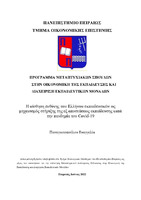Η αίσθηση ευθύνης των Ελλήνων εκπαιδευτικών ως μηχανισμός στήριξης της εξ αποστάσεως εκπαίδευσης κατά την πανδημία του Covid-19

Master Thesis
Συγγραφέας
Παναγιωτοπούλου, Ευαγγελία
Ημερομηνία
2022-07Επιβλέπων
Ελευθερίου, ΚωνσταντίνοςΠροβολή/
Λέξεις κλειδιά
Eτοιμότητα εκπαιδευτικών ; Εξ αποστάσεως διδασκαλία ; Επείγουσα απομακρυσμένη διδασκαλία ; COVID-19 ; Αίσθηση ευθύνης ; Έλληνες εκπαιδευτικοί ; Teachers' readiness ; Distance learning education ; Emergency remote education ; Sense of responsibility ; Greek teachersΠερίληψη
Η ποιότητα της εκπαίδευση που απολαμβάνουν οι πολίτες μίας χώρας αποτελεί ένα σημαντικό δείκτη της μελλοντικής οικονομικής και ψυχοσυναισθηματικής τους ευημερίας. Εν τούτοις, σε περιόδους κρίσης, όπως η υγειονομική πανδημία του Covid-19, οι μαθητές κινδυνεύουν να χάσουν πολύτιμες μαθησιακές ευκαιρίες, με επιπτώσεις τόσο στο μελλοντικό τους εισόδημα όσο και στην ψυχική τους υγεία. Το εκπαιδευτικό σύστημα κάθε χώρας καλείται να προσαρμοστεί στις έκτακτες συνθήκες, ώστε να παρέχει το καλύτερο δυνατό αποτέλεσμα στους μαθητές. Οι εκπαιδευτικοί, ως ο σημαντικότερος παράγοντας ενός εκπαιδευτικού συστήματος, αναλαμβάνουν σε μεγάλο βαθμό την επιτυχή προσαρμογή του εκπαιδευτικού συστήματος στις έκτακτες συνθήκες. Σκοπός της συγκεκριμένης έρευνας είναι να διερευνήσει το ρόλο των Ελλήνων εκπαιδευτικών στην διαχείριση της πανδημίας του Covid-19. Πιο συγκεκριμένα, εξετάζεται ο βαθμός ετοιμότητας των Ελλήνων δασκάλων να παρέχουν επείγουσα απομακρυσμένη διδασκαλία και η σχέση αυτής της ετοιμότητας με το δημογραφικό τους προφίλ και την προσωπική αίσθηση ευθύνης. Για το σκοπό αυτό, συλλέχθηκαν δεδομένα μέσω ερωτηματολογίου που διαμοιράστηκε σε διάφορα σχολεία της χώρας. Τα αποτελέσματα έδειξαν ότι το επίπεδο σπουδών των εκπαιδευτικών και το φύλο σχετίζονται θετικά και σε σημαντικό βαθμό με την ετοιμότητα παροχής απομακρυσμένης διδασκαλίας. Ακόμα, το επίπεδο σπουδών και η ηλικία σχετίζονται θετικά με την ετοιμότητα χρήσης νέων τεχνολογιών, ενώ η εκπαιδευτική προϋπηρεσία αρνητικά και το φύλο δεν εμφανίζει στατιστικά σημαντική σχέση. Ακόμα, η γεωγραφική τοποθεσία του σχολείου δεν σχετίζεται με την επάρκεια τεχνολογικού εξοπλισμού. Τέλος, η αίσθηση ευθύνης εμφανίζει θετική συσχέτιση χαμηλής ισχύος με την ετοιμότητα των εκπαιδευτικών. Αυτή η έρευνα αποσκοπεί να συμβάλει στην κατανόηση των παραγόντων που καθορίζουν την ετοιμότητα ενός εκπαιδευτικού συστήματος να διαχειριστεί επιτυχώς καταστάσεις κρίσης.

